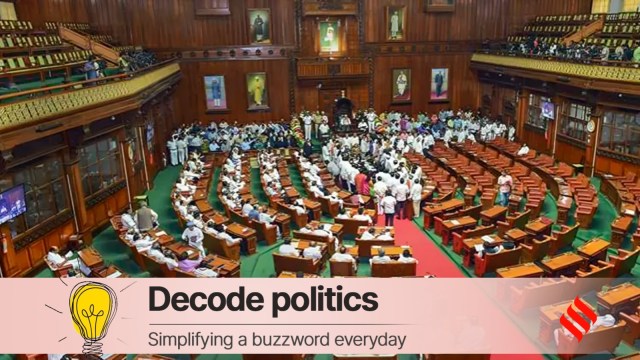Decode Politics: Why 4% quota for Muslims in Karnataka government contracts has BJP up in arms
As BJP alleges Siddaramaiah government providing “religion-based reservation” is unconstitutional, Congress hits back at “divisive politics”
 The 4% reservation is in addition to the one the Siddaramaiah-led Congress government provided to contractors from the Scheduled Castes (SC), Scheduled Tribes (ST), and Other Backward Classes (OBCs). (Photo: PTI File Photo)
The 4% reservation is in addition to the one the Siddaramaiah-led Congress government provided to contractors from the Scheduled Castes (SC), Scheduled Tribes (ST), and Other Backward Classes (OBCs). (Photo: PTI File Photo)Earlier this month, Karnataka Chief Minister Siddaramaiah announced a 4% reservation for Muslims under Category-2B in government contracts below Rs 2 crore and for procurement of goods and services below Rs 1 crore through various government departments. The CM made the announcement in his record 16th Budget presented on March 7.
The move sparked backlash from the Opposition BJP with the party’s state chief B Y Vijayendra on Sunday terming the move as “sarkari jihad” and vowing to protest against it both inside and outside the Assembly.
What is the “new quota”?
The 4% reservation is in addition to the one the Siddaramaiah-led Congress government provided to contractors from the Scheduled Castes (SC), Scheduled Tribes (ST), and Other Backward Classes (OBCs).
“Under the provisions of the Karnataka Transparency in Public Procurement (KTPP) Act, the reservation provided to SCs, STs, Category-1, Category-2A and Category-2B contractors will be increased to Rs 2 crore… The reservation provided in procurement of goods and services under various departments, corporations and institutions to supplies belonging to the SC, ST, Category-1, Category-2A and Category-2B will be up to Rs 1 crore,” the CM said in his Budget speech.
Siddaramaiah’s announcement came after Muslim legislators sought the CM’s intervention while claiming “to be the only backward community which was exempt from the quota”. Complaints from a section of small contractors from the minority community that alleged tenders were not being awarded to them despite being eligible to carry out the works is also being seen as a reason for the announcement.
On March 14, the state Cabinet approved the proposal to amend the KTPP Act to allow for the reservation to take effect.
What is the current quota in government contracts?
At present, SCs and STs enjoy a 24% reservation for government projects under Rs 2 crore and in procurement of goods and services below Rs 1 crore from government departments. Communities falling under Category-1 enjoy a 4% quota while the number stands at 15% for those falling under Category-2B.
What has the government said to justify the move?
Deputy CM D K Shivakumar on Sunday defended the government’s move while accusing the BJP of pursuing divisive politics. “Be it Muslims, Christians, Sikhs or Buddhists, they are all citizens of our country and state. We are concerned about all minorities and backward communities,” he said.
Taking a dig at the BJP, Shivakumar said those talking about unity should make a member of the Christian or Muslim community an MLC or Rajya Sabha MP or Union minister. “When they do so, Vijayendra would have the right to talk about equal opportunity for all,” he said.
What does the BJP claim?
Accusing the Congress government of resorting to “appeasement politics”, Vijayendra said in a post on X on Sunday, “4% today, 100% tomorrow. This is the new ‘sarkari jihad’ that the Siddaramaiah government is imposing on Hindus and ensuring systematic discrimination against the SCs, STs and OBCs.”
According to the Karnataka BJP chief, the latest move was in addition to the “land jihad through the Waqf board” and “anti-national jihad” – “Pakistan zindabad” slogans being raised in the Assembly – and “economic jihad” – unreasonably high funds allocated to the Waqf board and Muslim welfare – that the Siddaramaiah government was undertaking to “appease Muslims”. Vijayendra claimed that it “would not be wrong to say that the current administration is a reincarnation of Aurangzeb and Tipu Sultan’s court where anything anti-Hindu gets ratified instantly”.
How is the issue likely to play out politically?
With its latest move, the Congress government is looking to reinforce its support among Muslims, seen to be among its core constituencies that predominantly voted for the party in the 2023 Assembly elections.
According to numerous studies undertaken by the Karnataka State Backward Classes Commission, the community, comprising around 14% of the state’s population, is seen to be among the most backward with low representation in government jobs and education.
Though the new quota is along the lines of the existing reservation for SCs, STs and OBCs, the move has seemingly given ammunition to the BJP, which has accused the Congress of “appeasing Muslims” and alleged that the Congress is “unconstitutionally providing religion-based quota”.
Has the Siddaramaiah government made similar moves in the past?
During his first tenure as CM between 2013 and 2018, Siddaramaiah introduced reservation for SC and ST communities in government tenders up to Rs 50 lakh. After he returned to power in 2023, the limit was extended to Rs 2 crore while OBCs were added to the quota.
The BJP also slammed the Karnataka government’s recent Budget, alleging that the funds allocated were “focused on Muslims”. “The Congress government has presented an anti-people and Muslim budget. The budget is just for Muslims,” Leader of the Opposition in the Assembly R Ashoka had alleged, referring to the Rs 1,000 crore allotted for development of minority colonies and Rs 150 crore for the repair of Waqf properties.
In September last year, the Karnataka government mandated Urdu for anganwadi teachers in two districts, prompting strong reactions from the BJP that alleged the Siddaramaiah government was “sidelining Kannada”.
During his first term and in the run-up to the 2018 Assembly polls, Siddaramaiah was accused of withdrawing cases related to communal disturbances against the activists of the Popular Front of India (PFI). The BJP alleged that the Congress government was hand-in-glove with radical Islamic elements.





- 01
- 02
- 03
- 04
- 05


























